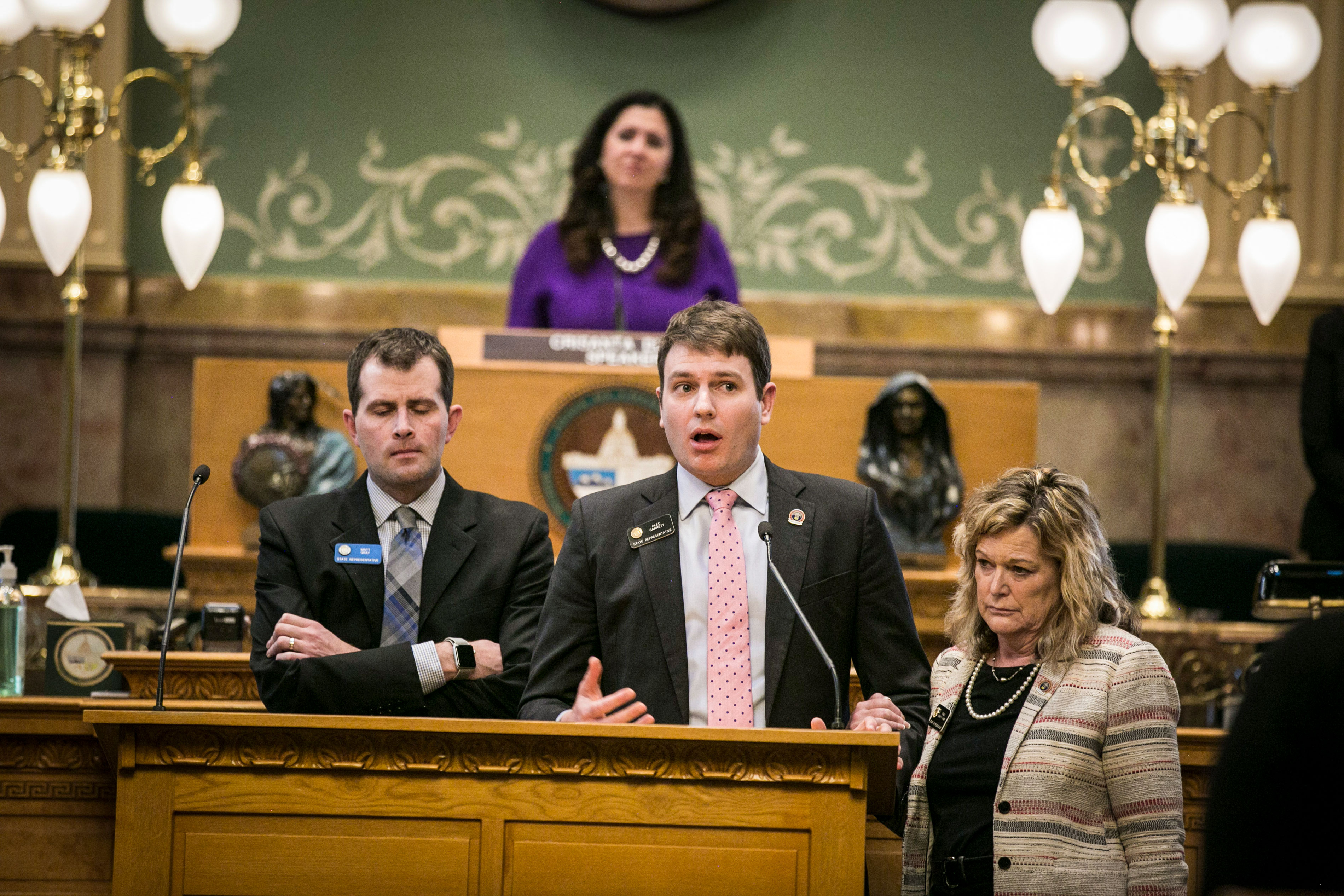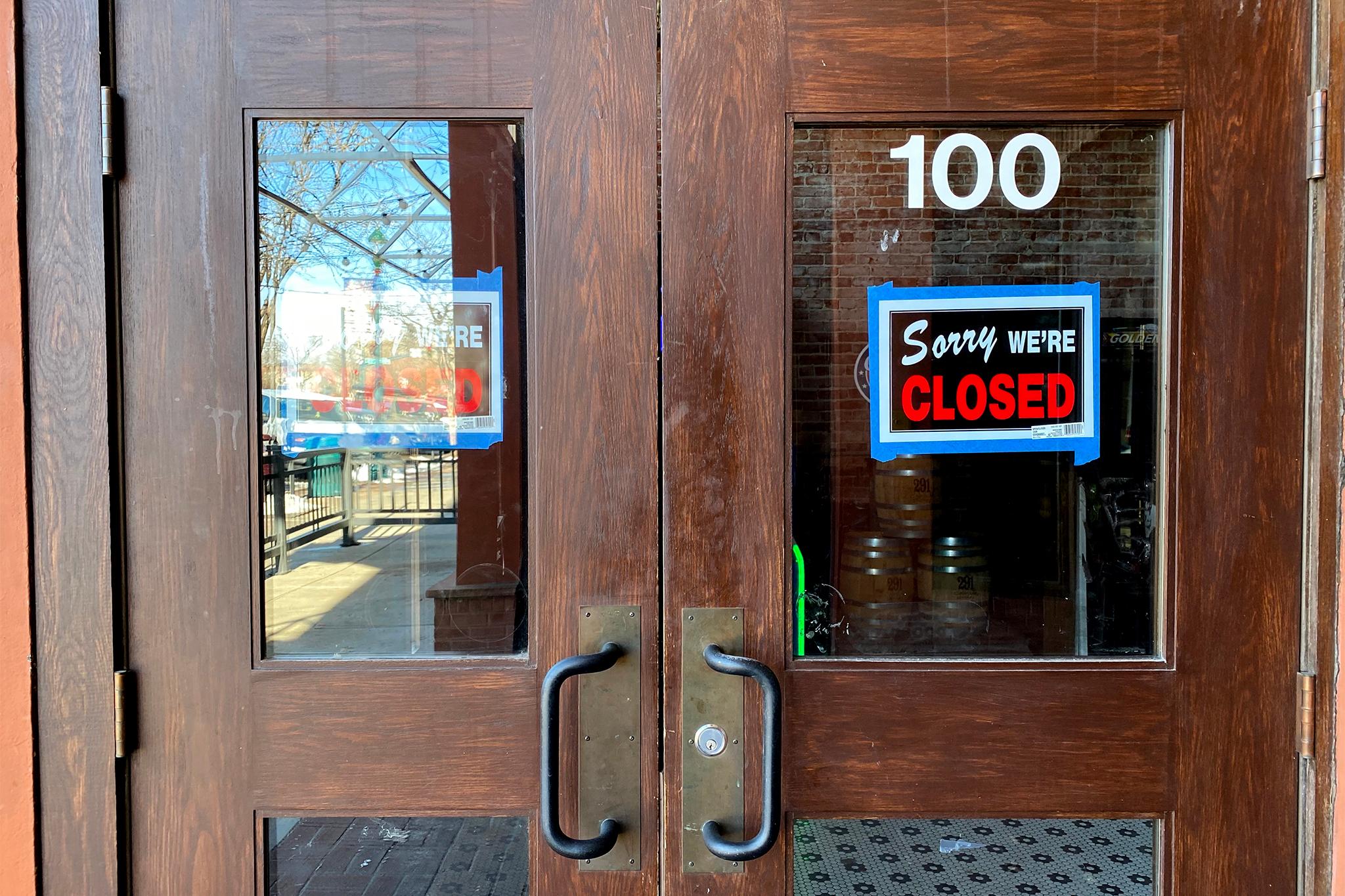

Published 5:54 a.m. | Updated 10:37 a.m.
Colorado’s 2018 legislative session could arguably go down as the most dramatic in state history.
If that seems like an exaggeration, talk to Rep. Alec Garnett. For the first part of the session, the Denver Democrat wore a bulletproof vest to the state Capitol as a precaution against former Rep. Steve Lebsock.
Garnett had corroborated a story from another Democratic lawmaker, Faith Winter, who said Lebsock harassed her at a party in 2016. Garnett said he knew Lebsock had an explosive temper, so he did what he could to protect himself.
“It’s something I won’t forget,” he said at the end of the session. “I hope no other legislator in the future is put in the situation where they fear another member to that point.”
In March, the Colorado House expelled Lebsock after an investigation upheld harassment complaints from five women. It was the first time lawmakers had ousted one of their own in over a century. During the tearful debate ahead of the vote, Garnett revealed he had been wearing the vest by patting the Kevlar under his button-down shirt.

While the #MeToo movement rocked the Capitol in 2018, Garnett said what he’ll remember most are the laws and policies he worked on. And many legislative initiatives did make through the assembly this year.
Here’s some of what survived the gauntlet and some of what didn’t.
What Passed
PERA Reform
Just hours before the end of the legislative session, state lawmakers announced a plan to stabilize the state pension system. The Public Employees Retirement Association faces an unfunded liability of at least $32 billion. Lawmakers had worked for months to find a way to fully fund the pension system in 30 years.
The final deal calls for sacrifices from retirees, employees and taxpayers. Here’s a breakdown:
- Contributions from current employees increase from 8 percent to 10 percent over a four-year period
- Year-over-year increases to retirement benefits, known as the cost-of-living adjustment, would pause for the next two years and be set at 1.5 percent after that. The current adjustment is 2 percent.
- The retirement age would increase from 60 to 64 for future hires, including teachers. (Editor's Note: This story was updated to confirm details for teachers. A previous version stated that the teacher retirement age would stay at 58. We regret the error.)
- Expands an option for a 401(k)-style plan to most state employees, but not school employees.
Republican State Sen. Jack Tate praised the deal after it cleared the Senate.
“We can solve problems here in the legislature,” Tate said. “The solvency of the public pension system is one of the biggest problems we’ve had in maybe 10 years.”
This was a nail biter.
The CO House has voted 34-29 for a plan to stabilize the state pension system, better known as PERA. Many Democrats, including Speaker Duran, voted no. #copolitics pic.twitter.com/sAgejpjH05
Reauthorization Of The Colorado Civil Rights Commission
Another issue that came down to the wire was the Colorado Civil Rights Commission. The panel hears discrimination cases and has landed in hot water with some Republicans, who say its decisions are often tilted against businesses.
A chief example for critics is the Masterpiece Cake case. That’s when the members of the commission sided against a Lakewood baker who refused to make a wedding cake for a same sex couple. The case is now before the U.S. Supreme Court with a decision expected in June.
The Colorado Civil Rights Division, which houses the commission, was up for reauthorization at the legislature this year. Senate Republicans used the opportunity to seek changes to the commission, like splitting the members equally between Democratic, Republicans and unaffiliated voters. House Democrats objected that partisan appointments would politicize the commission.
Looks like there's now a deal on the CCRD.
✔️ 3 Rs, 3Ds, 1 unaffiliated
✔️ 3 business reps, 3 labor reps, 1 at large
✔️ Stonger power in the Senate to reject Gov appointments#copolitics pic.twitter.com/FtyxugQ7Ur
After a head-spinning set of negotiations, lawmakers agreed to reauthorize the commission for another nine years. The new plan adds a third representative from the business community. It also closes a loophole Gov. Hickenlooper used to re-appoint a commissioner in 2017, even after she had been rejected by the state Senate.
Democrats also conceded to splitting up the commission along party lines. Under the new plan, no more than three members could be from either major party.
The State Budget
A balanced state budget is one of the few things lawmakers have to do every year. The exercise is often a scramble for limited resources, but 2018 was different. In March, state economists announced Colorado had a $1.3 billion surplus thanks to a booming economy and the federal tax overhaul.
The windfall gave lawmakers some breathing room to strike deals. The final $28.9 billion budget included a significant investment in transportation (more on that in a bit). K-12 funding also received a $150 million boost, which will help buy down the gap between actual education spending and what the state constitution requires. Lawmakers also set aside $35 million for school security grants.
A Transportation Funding Deal
For years, state lawmakers have debated the best way to address a $9 billion backlog of road projects. Lawmakers landed on a solution to pay for part of the list in the final days of the session.
The deal dedicates $50 million a year for road projects through 2039. In the short term, transportation projects would see one-time investment of $495 million this fiscal year and $150 million next fiscal year. Most the spending would go toward state highway projects, but cities and transit would each get 15 percent of the investment.
The bill will also refer a measure to the ballot in 2019 to ask voters to let the state sell $2.3 billion in bonds, unless other transportation funding initiatives pass in the upcoming November election. Outside groups are at work on competing ballot measures. The Denver Metro Chamber of Commerce is pushing a sales tax hike for road and transit development. Meanwhile, the Independence Institute, a libertarian think tank, is seeking approval for a $3.5 billion bonding package.
To put it another way, lawmakers have left the key in the ignition. Voters decide what’s next.
Bills To Address The Opioid Crisis
Prior to the legislative session, a special committee submitted five bills to address Colorado’s opioid crisis. One would have limited opioid prescriptions to a 7-day supply, with some exceptions for cancer patients and others with chronic pain.

The legislature passed the measure, but state Democratic Rep. Brittany Pettersen, who helped lead the effort, said it doesn’t go far enough.
“I think that it’s a first step, but by no means does it solves the problem,” said Petterson. “It is the bare minimum”
The other bills take a broad approach to Colorado’s opioid crisis. They call for further study on harm reduction, seek to attract mental health professionals to rural areas like the San Luis Valley and rework rules for insurance coverage of substance abuse treatment.
Lawmakers did reject the package’s most controversial proposal, which would have allowed Denver to pilot a safe injection site. That’s a facility where people can access sterile equipment and use their drugs under medical supervision.
The goal is to prevent overdoses and potentially open a door to connect addicts with treatment. Opponents, mostly Senate Republicans, worried the facility sent a message of condoning drug use. A handful of cities around the country, including San Francisco and New York, are experimenting with safe injection sites, but Colorado lawmakers aren’t ready to join them, yet.
Redistricting Reform
The legislature has a big task ahead of it in 2021. That’s when lawmakers will have to reset Colorado’s Congressional boundaries. The task is expected to be especially contentious because the state will likely add an eighth congressional district following the next national Census.
This session, every Colorado lawmaker decided to ask voters to approve a different process.
Rather than have lawmakers set the districts, a special commission of Republicans, Democrats and unaffiliated voters would decide the map. The initiative would also ban partisan gerrymandering and require the commissioners to create a reasonable number of competitive districts. A parallel initiative would set up a nearly identical process for legislative redistricting.
Flowline Mapping, Kind Of
A little over a year ago, a home in Firestone, Colorado exploded and killed two people. Investigators linked the disaster to a severed underground flow line, which connects a natural gas wellhead to a collection tank.
In response, some statehouse Democrats pushed legislation to map all of Colorado’s flowlines. Republicans shot down the idea.
A bipartisan bill passed this year takes another approach. It would beef up Colorado 811, the state’s “call before you dig” system. The hope is that tighter enforcement of existing laws will force companies to keep better track of their underground infrastructure.
Rural Broadband
For years, people in rural Colorado have argued that a lack of high-speed internet has kept them out of the state’s economic boom, while the Front Range has had the full advantage of broadband.
Gov. Hickenlooper signed two bills to ease the disparity. One gives the state more leeway to seek federal resources for broadband deployment. Another bill accelerates a plan to shift a subsidy for rural phone service into grants for internet infrastructure in small towns and unincorporated areas. The law adds about $100 million for rural broadband development over the next five years.
What Didn’t Pass
Red Flag Law
In the wake of the Parkland shooting, states around the country have considered whether to adopt “red flag” laws. Already on the books in nine states, the policies allow judges to order someone to surrender their firearms if they are deemed a threat to themselves or others.
The issue took on additional weight in Colorado because of an incident last New Year’s Eve. That’s when officers in Douglas County responded to calls concerning Matthew Riehl, who had a small arsenal and known history of mental illness. Riehl opened fire from inside his apartment, killing Deputy Zackari Parrish and injuring four other officers.
Colorado’s version of the red flag bill was introduced in the final weeks of the session. It had the support of some in law enforcement and a few Republicans, but it met firm resistance from gun rights advocates who argued it didn’t include enough due process protections for gun owners and might prevent people from seeking psychological help. The bill died in the Republican-led Senate toward the end of the session.
New Sexual Harassment Policies
Allegations of sexual misconduct punctuated the session. From the start, most lawmakers agreed they needed to address a culture that led to multiple harassment complaints against sitting lawmakers and the expulsion of Rep. Steve Lebsock.
The process proved more complicated than anticipated. In April, an outside firm released an investigation into the culture at the Capitol, which included recommendations for how to revise the legislature’s workplace harassment policies.
Rather than act on those recommendations, lawmakers appointed a six-member committee to study the issue during the legislative offseason and draft potential bills for the next session.
CPR’s Megan Verlee contributed to this report.









